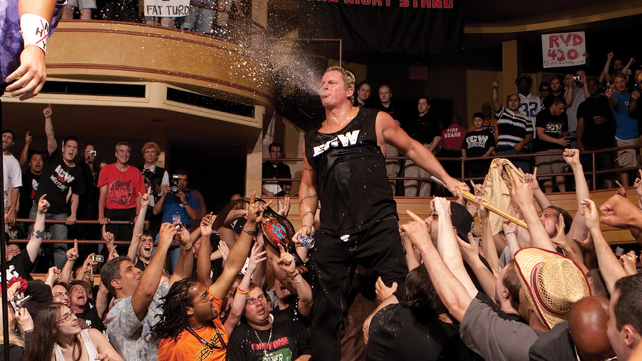"I don't want to be at the mercy of my emotions. I want to use them, to enjoy them, and to dominate them." - Oscar Wilde, 1854-1900.
Addiction is a powerful emotion that can be used as either a tool or a weapon. It is the prime example of prolonged wrestling careers such as Ric Flair or Hulk Hogan. In 1994, these behemoths stood atop the grappling globe. Whilst arguably past their peak of physical condition, they populated WCW's second-half of the year and set Stateside records for wrestling television ratings.
However, was this addiction to the limelight a powerful tool for them to show everything about the profession they loved and grant the ability to allow them to share this love with a new generation of fans; or was it ultimately a powerful weapon which would see bonafide stars such as Sting almost disappear completely from the WCW landscape.
WWF was not outwith the same proposition in the same year with Jerry Lawler and Roddy Piper famously headlining June's King of the Ring, despite the ongoing promotional drive for the Federation's 'New Generation'. The talisman for this campaign would undoubtedly be Bret Hart. Who in his eight-month reign as champion never headlined a single pay per view.
This emotional pull is by no means restricted to in-ring competition, as it could most likely be served as the principle reason for the investment of fans worldwide. But, again, is it a tool for the benefit of enjoyment; or a weapon which inevitably takes hold of a person before ultimate disappointment.
The best example of a fan-driven wrestling promotion from this period of time was ECW. It captured crowd emotion and maximised it to the benefit of the company by way of presenting an innovative, alternative, product; and to the fanbase by giving them believeable characters, worthy of their time and attention. ECW was recently given the Promotion of the Year award in the Wrestling 20 Years Ago 1994 year-end review. It showed the passion of the business presented in a way that got the live audience's ultimate emotional investment as well as creating a revolution for those watching via television and video. It was a love affair with bands of barb wire in a church of pain encapsulated by the sharing of vows between the congregation and the party of performers.
The marriage of Extreme Championship Wrestling died in 2001.
The spirit of Philadelphia wrestling crowds lives to this day. In the past fourteen years, they have looked to rekindle this romance through independent events involving the former stars of the nineties, seeing their heroes go on to find new relationships with different promotional partners and even the attempt at replicating the marriage under the WWE banner in 2006.
Despite this endless search for what they love, it had gone forever. But, like in all cases of emotional addiction, wrestling fans are dragged back in to their relationship with the product. Even in times where they see their emotions as being abused, the love of what once was outweighs their sight of what is.
The physically, mentally and emotionally abused partner of a wrestling fan is drawn to the physical, mental and emotional abuser of the wrestling industry like a moth to a flame. The notion of burning is ignored and the warmth of the fire is explored.
The emotional addiction is the industry's biggest weapon. And the emotional addiction is the fan's biggest tool. The greatest trick the Devil ever pulled was convincing the world He didn't exist. The greatest trick the wrestling industry ever pulled was convincing the fans that they didn't care.
Long after the dust has settled on 2015's Royal Rumble, the wrestling industry will continue to evolve and with their evolution will gain a greater level of investment than ever. Because the emotionally addicted fanbase seeking revolution will again fall foul to the machine of emotional puppeteers.

 RSS Feed
RSS Feed